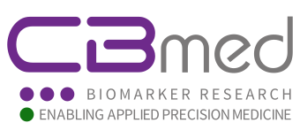Total Quality Management at CBmed
Total Quality Management (TQM) is a philosophy that drives the work at CBmed. The process establishes an environment that allows scientists to perform and deliver at the highest stage.
When it comes to research, quality is of outmost importance: Experiments and results must be reproducible in a way that the data is verifiable. At a facility that does research on behalf of a customer who is expecting high quality work, additional aspects must be taken into account. The research facility has to assure that all cooperating partners as well as the suppliers and service providers follow the same high standards. That means lab work, experiments and data analysis only form the tip of the iceberg. CBmed expands the demand on quality beyond the actual lab work and includes all non-scientific internal processes, such as human resources, finances or management. Particularly in biomarker research, Total Quality Management means to establish an environment that allows scientists to perform and deliver at the highest stage.
Total Quality Management (TQM) can be seen as a holistic approach, imposing quality on every process within and beyond a company. In a way, TQM can be seen as the next level in a long chain of proven and acknowledged quality measures. These earlier measures include
- quality control to identify error-prone and deviating processes
- quality management to detect and correct errors
- quality management that includes planning, different market oriented QM-systems and the rise of customer expectation
In TQM, quality is rather defined as a living process than a static aim. It involves employees at all levels and it covers all areas of the company, including the entire supply chain. Therefore, TQM is a steady process – all members are embedded and contributing to an environment of permanent learning and improving. Properly set up, it should be the goal not only to meet the customer’s expectations, but to exceed them.
Keeping up with high standards in quality control
Initially, CBmed started from an EFQM level (European Foundation for Quality Management), which served as a basic guideline. At the same time, different standards for research devices are implemented, such as international standard guidelines for the flow cytometry or for the pre-analytical handling of samples in the liquid biopsy cancer projects. All lab processes are documented with the Lab Information and Management System (LIMS). It can comprehensively track patient samples until arrival in the lab, during the processing in the lab all the way down to the reports and their storage. Currently, CBmed is constantly working towards implementing the latest ISO certification standards for medical laboratories (15189). Besides LIMS, the software BMD is used to run the finances, while MS Sharepoint serves as a platform for internal and external document management.
A good example for the TQM approach at CBmed is the 2.20/Liquid Biopsy project, which required the implementation of minimally invasive methods for personalized medicine in tumor diagnostics and therapy monitoring in everyday clinical practice – which only works via standardized pre-analytics. Therefore, the standards from the field of laboratory diagnostics were extended to the sampling and processing of patient samples in order to have full control over the quality of the samples. For liquid biopsy in cancer research and therapy monitoring, all processes have been aligned to the existing ISO standards. First, the most suited sampling devices and methods have been identified to run several analyses based on circulating tumor DNA, tumor derived RNA and circulating tumor cells – including sequencing and in situ technique done at the bulk level and also on single cell level. The next step was the synchronisation with the clinical partners to confirm the patient cohorts, the people involved in patient allocation and sampling. Then, the assembled kits necessary for sampling have been prepared and sent to the clinical partners. Colleagues involved in patient recruitment and sample preparation closely communicated about patients expected at the clinics to start the preparations necessary for the day of sampling. SOPs were drafted to orchestrate several steps of the sample preparation, covering analytic pre-enrichment, storage, downstream processing and analyses of the samples. All relevant data was documented accordingly, and results were regularly fed back to the interdisciplinary teams of clinicians and researchers.
Total Quality Management at CBmed.
Benefits of TQM
2021, the TQM focus will be on the Drug Screening Platform, which will be significantly driven by an overall quality approach. Despite the limitations brought on by the pandemic we set up the Drug Screening Platform in 2020 and ran the on-site test in October 2020. Already by the end of 2020 we conducted the first experiments. Since then, CBmed works on implementing the standardised workflows together with our Korean Partners Aimed Bio and Avatamed. Parallel to setting up the laboratory workflows, a detailed tracking and documentation system has been established using the LIMS software. Next steps involve implementing the academic and scientific partners as well as our service providers to assure standardised patient sampling, pre analytical handling of patient samples and data processing. We expect to routinely perform drug screening tests on tumor material from patients later this year.
Improving quality will always be important in research – especially for biomarker research in such an important area like cancer. Therefore, CBmed adapts and applies the ZERO-DEFECT access as a holistic quality approach for the field of biomarker research. All these activities have additional effects, because TQM demands constant activity – it is a process and, therefore, more vivid than quality measures that aim at establishing a specific standard. After all, TQM is also a philosophy. It generates a commons sense of working in and between teams, constantly shaping their way of work. This is the biggest benefit of TQM.
The Authors
Dr. Thomas Kroneis
Head of Total Quality Management
Julia Schmidt, BSc
Business Development






